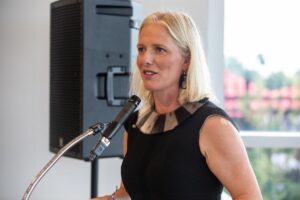
People & Culture
Kahkiihtwaam ee-pee-kiiweehtataahk: Bringing it back home again
The story of how a critically endangered Indigenous language can be saved
- 6310 words
- 26 minutes
This article is over 5 years old and may contain outdated information.
People & Culture

Toronto’s York University is taking its commitment to experiential education to new heights. In May 2016, the university’s Faculty of Environmental Studies opened a new facility for students in Costa Rica, the Lillian Meighen Wright Centre. I was fortunate enough to join its inaugural class of 30 on a three-week tour of the country as a teaching assistant, during which the students gave presentations, attended lectures and planted trees.
The new centre is the latest addition to the university’s Las Nubes (“the clouds”) Project. This initiative was created by Dr. Howard Daugherty of York’s FES, and was made possible by a 1998 donation from Toronto physician Woody Fisher that included Costa Rica’s Las Nubes rainforest. In turn, York University created the Dr. Woody Fisher Fund for Neotropical Conservation to protect this rainforest through an agreement with Costa Rica’s Tropical Science Center.

Costa Rica’s Las Nubes Rainforest, home to York University’s new EcoCampus. (Photo courtesy Mark Terry)
The Lillian Meighen Wright Centre is the jewel in the crown of York’s new EcoCampus. The 400-square-metre facility overlooks the Peñas Blancas River, offering indoor classrooms and laboratories, an outdoor indigenous classroom, an arboretum and botanical gardens. Having partnered with all five of Costa Rica’s public universities, the facility is also available to local students. It will operate as a local, national and international hub dedicated to education and research on neotropical conservation, eco-health, community well-being and the sustainable livelihoods of those who live and work in the area.
Two courses were offered to the York students during this first excursion: Ecology and Sustainability in Costa Rica, taught by Professor Felipe Montoya, and Globalization and Indigenous People, taught by Professor Ravi de Costa.
Field courses began in San Jose, the nation’s capital. From there our group travelled to the mountains, staying at cloudforest eco-lodges and hiking through the dense and biodiverse forests there. In addition to experiencing nature first-hand on hikes through both public and privately-owned nature reserves, we visited a wind farm, where we learned about Costa Rica’s unique success with alternative energy production. Since 2014, 99 per cent of the Central American country’s electrical power been derived from renewable energy sources, including 80 per cent from hydroelectricity.

Cotton coloured by dyes derived from local plants. (Courtesy Mark Terry)
One of the highlights of the trip was meeting and living with some of the country’s rural people in the villages of Quizarra and Santa Elena of Perez Zeledon. In addition to becoming part of their families for a week, the students participated in the community’s annual cultural festival, designing posters based on their studies. Home stays with families from the indigenous Boruca (Brunka) — a tribe of about 2,660 people — provided a unique perspective into the lifestyle and culture of aboriginal people. The students learned how the Brunka make their own dyes, medicines and fabrics from local vegetation, and how to carve and paint decorative balsa wood wall masks in the native Brunka tradition.

A true hands-on experience with the mysterious stone spheres of the extinct Disquis tribe. (Courtesy Mark Terry)
Ancient generations of indigenous people in Costa Rica also left their mark in petroglyphs (stone carvings) and perfectly circular stone spheres. Many of these mysterious spheres are found at the Palmar Sur Archeological Excavation site, in an area known as the Diquis Delta, and are attributed to the now extinct tribe of the Diquis people. While generally believed to have been created for ceremonial use, their exact purpose is still unknown.
Farming techniques, both commercial and family-run, were also a major focus of the field trip. We visited large corporate farms such as Del Monte’s pineapple plantation, as well as several coffee farms, and learned about a variety of agricultural methods. For the most part, the larger fields were mono-cropped, while smaller coffee farms were diversified with other fruit and vegetable crops. One small farm, privately-owned and operated by a young couple who grow crops and livestock primarily for their own use, demonstrated how sustainable land in Costa Rica can be for land-owners.
And of course, the students received lessons in eco-tourism — one of Costa Rica’s fast-growing industries. Zip-lining, kayaking, horseback riding, surfing and swimming at beaches in national parks were welcomed by students and teachers alike.

The students after a day of zip-lining through the Costa Rican rainforest. (Photo courtesy Mark Terry)
The Las Nubes Project is one of the most comprehensive, detailed and well-organized field courses available today. Dr. Felipe Montoya, executive director of the program, attributes its success to providing a more hands-on educational experience. “By providing students learning opportunities like these outside the classroom,” he says, “they come to understand at a deeper and more meaningful level.”
The plan for 2017 is to expand the program to a two-month semester and to offer as many as five undergraduate and graduate courses at the EcoCampus.
Are you passionate about Canadian geography?
You can support Canadian Geographic in 3 ways:

People & Culture
The story of how a critically endangered Indigenous language can be saved

Places
In Banff National Park, Alberta, as in protected areas across the country, managers find it difficult to balance the desire of people to experience wilderness with an imperative to conserve it

People & Culture
A century after the first woman was elected to the Canadian Parliament, one of the most prominent figures in present-day politics shares her thoughts on how to amplify diverse voices in the Commons

People & Culture
In honour of Asian Heritage Month, CBC Quebec journalists asked Asian Canadians how they carry their culture